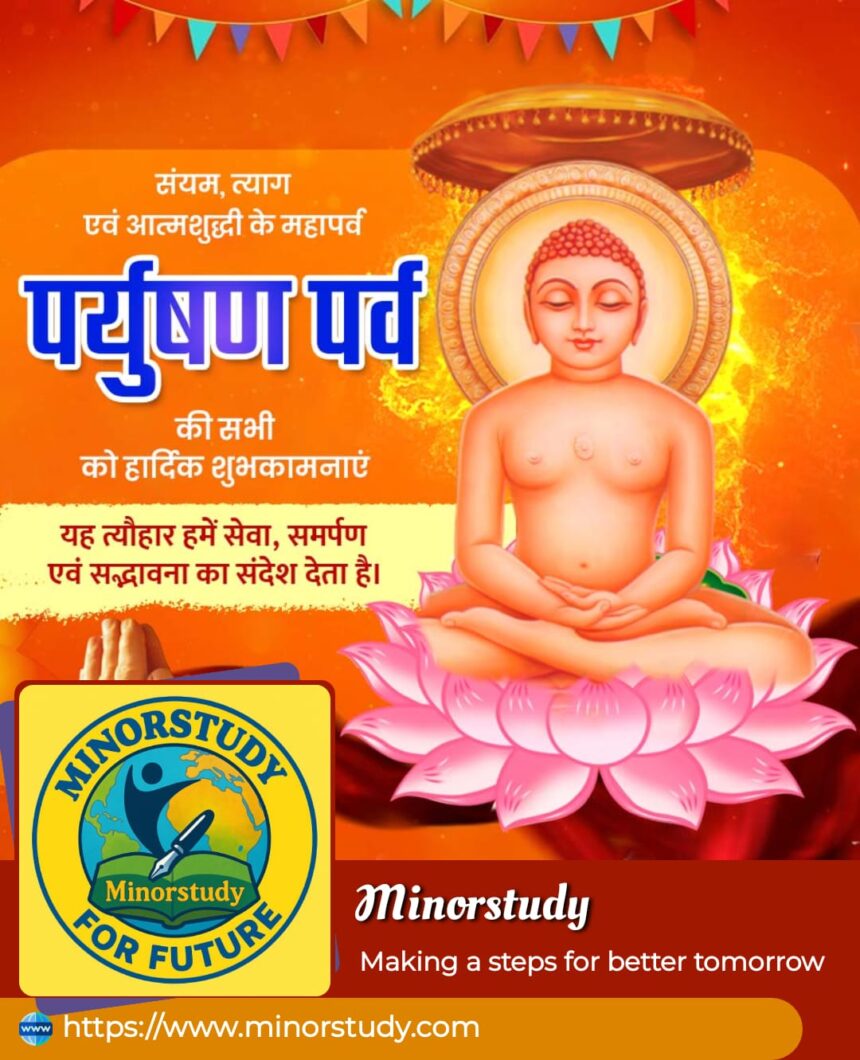✨ Introduction: The Soulful Essence of Paryushan Festival
Festivals are not just celebrations; they are reminders of values that shape our lives. Among such festivals, Paryushan Parv (or Paryushan Festival) holds a unique place in Jainism. It is not merely a religious observance but a spiritual detox, a chance to pause, reflect, forgive, and realign life with purity, non-violence, and truth.
- 📜 History of Paryushan Festival
- 📊 Timeline of Paryushan Festival
- 📌 Key Facts about Paryushan Festival
- 🌼 Significance of Paryushan Festival
- 🙏 Observance & Rituals of Paryushan
- 🎉 Wishing during Paryushan
- 📌 Importance of Paryushan Festival in Daily Life
- 🌍 Societal Importance of Paryushan
- ❓ FAQs on Paryushan Festival
- 🌟 Conclusion: The Daily Life Impact of Paryushan
In a world filled with material rush, Paryushan provides a positive break, urging people to look inward. Its impact goes beyond Jain communities—it inspires anyone who seeks peace, forgiveness, and self-discipline.
📜 History of Paryushan Festival
The word “Paryushan” comes from two Sanskrit words: “pari” (all around) and “ushana” (to stay close or dwell within). Thus, Paryushan means “to stay close to the soul”.
Origins: The roots of Paryushan go back thousands of years when Jain monks would travel on foot. During the monsoon season, traveling became difficult, so they stayed in one place and engaged in deep spiritual practices. This tradition gave rise to the idea of laypeople also dedicating a special period to penance and self-purification.
Scriptural Base: Ancient Jain texts highlight Paryushan as a time for self-control, forgiveness (kshama), fasting, meditation, and deep study of scriptures.
Duration: Traditionally, Shwetambara Jains observe it for 8 days, while Digambara Jains call it Das Lakshan Parva, lasting 10 days.
📊 Timeline of Paryushan Festival
Here’s a brief timeline of how Paryushan evolved:
Ancient Era: Monks settled in one place during monsoon; devotees practiced self-discipline alongside them.
Middle Ages: Jain communities institutionalized Paryushan as a formal festival.
Modern Era: It became a recognized annual Jain observance, emphasizing Ahimsa (non-violence), Satya (truth), and Kshama (forgiveness).
Today: Celebrated globally by Jain communities, with sermons, meditation, fasting, and the grand finale of Kshamavani Diwas (Day of Forgiveness).
📌 Key Facts about Paryushan Festival
Observed by: Jain community (both Shwetambara and Digambara).
Duration: 8 days (Shwetambara) and 10 days (Digambara).
Final Day: Known as Kshamavani (Forgiveness Day).
Core Teachings: Non-violence, truth, forgiveness, celibacy, and non-possession.
Fasting: Many devotees fast completely or partially; some practice Atthai Tap (fasting for all 8 days).
Greeting: “Micchami Dukkadam” (I seek forgiveness for any hurt caused knowingly or unknowingly).
🌼 Significance of Paryushan Festival
The true significance of Paryushan lies in its transformative power:
Spiritual Cleansing: It helps devotees cleanse their karma through fasting, meditation, and repentance.
Forgiveness as Strength: The practice of asking and granting forgiveness breaks ego and nurtures harmony.
Mindful Living: Encourages people to live with restraint, self-control, and compassion.
Universal Message: Its teachings of non-violence and truth resonate with all humanity.
Cultural Unity: Brings Jain families and communities together in devotion and reflection.
🙏 Observance & Rituals of Paryushan
Pratikraman: Daily introspection and repentance prayers.
Scripture Reading: Texts like Kalpasutra are recited.
Fasting: Ranges from one-day fasts to complete 8-day fasting.
Meditation & Bhakti: Special emphasis on samayik (meditation) and chanting.
Forgiveness Day (Kshamavani): Everyone seeks forgiveness with the words “Micchami Dukkadam”.
🎉 Wishing during Paryushan
When wishing someone during Paryushan, heartfelt messages carry blessings of peace, forgiveness, and compassion.
“Wishing you peace, purity, and inner strength this Paryushan. Micchami Dukkadam!”
“May this Paryushan inspire forgiveness, harmony, and self-discipline in your life.”
“On this sacred occasion, let us forgive and move ahead with love. Happy Paryushan!”
📌 Importance of Paryushan Festival in Daily Life
Even outside Jainism, the practices of Paryushan hold deep relevance:
Forgiveness Heals: Letting go of grudges brings inner peace.
Self-Discipline: Fasting and restraint sharpen willpower.
Mindfulness: Daily reflection reduces stress and increases clarity.
Non-Violence: Encourages compassion toward humans, animals, and the environment.
Stronger Bonds: Asking forgiveness repairs broken relationships.
🌍 Societal Importance of Paryushan
In a society struggling with conflict, anger, and materialism, Paryushan spreads a healing message:
Promotes peaceful coexistence.
Encourages eco-friendly living by reducing consumption.
Strengthens moral values and empathy.
Reminds us that true wealth is purity of soul, not possessions.
❓ FAQs on Paryushan Festival
Q1. Why do Jains fast during Paryushan?
A: To purify the soul, reduce karma, and practice self-discipline.
Q2. What does “Micchami Dukkadam” mean?
A: It means “If I have caused you hurt knowingly or unknowingly, I seek your forgiveness.”
Q3. Is Paryushan relevant only for Jains?
A: No, its values—like forgiveness, non-violence, and truth—are universal.
Q4. Can children observe Paryushan?
A: Yes, children are encouraged to learn values through small acts of kindness, prayers, or simple fasting.
Q5. How is Paryushan different for Shwetambara and Digambara Jains?
A: Shwetambaras observe it for 8 days; Digambaras celebrate it as Das Lakshan Parva for 10 days.
🌟 Conclusion: The Daily Life Impact of Paryushan
The Paryushan Festival is more than a religious observance; it is a life lesson in compassion, forgiveness, and discipline.
In daily life, when we let go of grudges, practice mindfulness, and live with restraint, we embody the true spirit of Paryushan. Its call for universal forgiveness (Kshamavani) is not only revolutionary but also healing in today’s divided world.
So, as this festival comes each year, let us embrace it not as a formality but as a positive turning point—a reminder that purity of soul and kindness in heart are the greatest treasures.
💡 Micchami Dukkadam! 🌸








